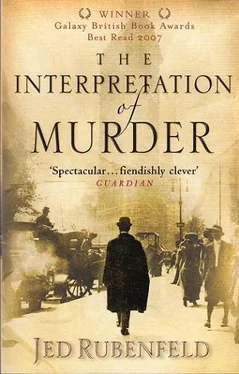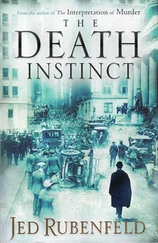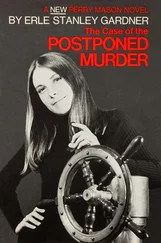Jed Rubenfeld - The Interpretation of Murder
Здесь есть возможность читать онлайн «Jed Rubenfeld - The Interpretation of Murder» весь текст электронной книги совершенно бесплатно (целиком полную версию без сокращений). В некоторых случаях можно слушать аудио, скачать через торрент в формате fb2 и присутствует краткое содержание. Жанр: Исторические приключения, на английском языке. Описание произведения, (предисловие) а так же отзывы посетителей доступны на портале библиотеки ЛибКат.
- Название:The Interpretation of Murder
- Автор:
- Жанр:
- Год:неизвестен
- ISBN:нет данных
- Рейтинг книги:5 / 5. Голосов: 1
-
Избранное:Добавить в избранное
- Отзывы:
-
Ваша оценка:
- 100
- 1
- 2
- 3
- 4
- 5
The Interpretation of Murder: краткое содержание, описание и аннотация
Предлагаем к чтению аннотацию, описание, краткое содержание или предисловие (зависит от того, что написал сам автор книги «The Interpretation of Murder»). Если вы не нашли необходимую информацию о книге — напишите в комментариях, мы постараемся отыскать её.
The Interpretation of Murder — читать онлайн бесплатно полную книгу (весь текст) целиком
Ниже представлен текст книги, разбитый по страницам. Система сохранения места последней прочитанной страницы, позволяет с удобством читать онлайн бесплатно книгу «The Interpretation of Murder», без необходимости каждый раз заново искать на чём Вы остановились. Поставьте закладку, и сможете в любой момент перейти на страницу, на которой закончили чтение.
Интервал:
Закладка:
'I don't want to hear it,' said the coroner. They had arrived at his office. 'I don't want to hear any more about it. Go to the mayor, why don't you? No doubt you'll find a ready audience with him. I told you, the case is closed.'
Littlemore blinked and shook his head. He noticed the stacks of documents and the packing boxes spread out on the office floor. 'Are you going somewhere, Mr Hugel?'
'As a matter of fact, I am,' said the coroner. 'I'm quitting this employ.'
'Quitting?'
'I cannot work under these conditions. My conclusions are not respected.'
'But where will you go, Mr Hugel?'
'You think this is the only city that requires a medical examiner?' The coroner surveyed the boxes of records strewn about his office. 'I understand a position is available in Cleveland, Ohio, as a matter of fact. My opinions will be valued there. They will pay me less, of course, but that is no matter; I have a substantial sum set aside already. No one will be able to complain about my records, Detective. My successor will find a perfectly organized system — which I created. Do you know what the state of the morgue was before I came here?'
'But Mr Hugel,' said the detective.
At that moment, Louis Riviere and Stratham Younger appeared in the corridor. 'Monsieur Littlemore!' cried Riviere. 'He's alive!'
'Unfortunately,' agreed the coroner. 'Gentlemen, if you'll excuse me, I have work to do.'
Clara Banwell was cooling herself in a bath when she heard the front door slam shut. It was a Turkish bath, with blue inlaid Mudejar tiles from Andalusia, installed in the Banwells' apartment at Clara's special request. As her husband's voice bellowed her name from the entry hall, she wrapped herself hastily in two white bath towels, one for her torso and another around her hair.
Still dripping, she found her husband in their forty-fivefoot living room, a tumbler in his hands, gazing out at the Hudson River. He was pouring himself a bourbon over ice. 'Come here,' said Banwell from across the room, without turning around. 'You saw her?'
'Yes.' Clara remained where she was.
'And?'
'The police believe she did the injury to herself. They believe she is either mad or pursuing a vendetta against you.'
'What did you tell them?' he asked.
'That you were here at home all night.'
Banwell grunted. 'What does she say?'
'Nora's very fragile, George. I think — '
The sound of a whiskey bottle banging down on a glass- topped table interrupted her. The table didn't crack, but alcohol splashed from the bottle's mouth. George Banwell turned to face his wife. 'Come here,' he said again.
'I don't want to.'
'Come here.'
She obeyed. When she was close to him, he glanced down.
'No,' she said.
'Yes.'
She undid her husband's belt. While she extracted the belt from the loops of his trousers, he poured himself another drink. She handed him the black leather strop. Then she lifted up her hands, palms together. Banwell corded the belt around her wrists, threaded its buckle, pulled it tight. She winced.
He jerked her to him and tried to kiss her lips. She allowed him to kiss only the corners of her mouth, turning her cheek first one way, then the other. He buried his head in her bare neck; she took in a mouthful of air. 'No,' she said.
He forced her to her knees. Though bound by the belt, she could move her hands well enough to unfasten her husband's trousers. He tore the white towel from her body.
Sometime later, George Banwell sat on the davenport, fully dressed, sipping bourbon, while Clara, naked, knelt on the floor, her back to her husband.
'Tell me what she said,' he instructed her, loosening his tie.
'George' — Clara turned and looked up at him — 'couldn't it be over now? She is only a little girl. How can she hurt you any more?'
She sensed immediately that her words had fueled, rather than dampened, her husband's latent anger. He rose to his feet, buttoning himself. 'Only a little girl,' he repeated.
The Frenchman must have had a soft spot for Detective Littlemore. He kissed him on both cheeks.
'I got to play dead more often,' said Littlemore. 'This is the nicest you've ever been to me, Louie.'
Riviere pressed a large folder into the detective's arms. 'It came out perfectly,' he said. 'I have surprised even myself, actually. I did not expect such detail in an enlargement. Very unusual.' With this, the Frenchman withdrew, calling out that it was au revoir, not adieu.
I was now alone with the detective. 'You — played dead?' I asked him.
'It was just a joke. When I came to, I was in an ambulance, and I got the idea it might be funny.'
I reflected. 'Was it?'
Littlemore looked around. 'Pretty funny,' he said. 'Say, what are you doing here?'
I told the detective I had made a discovery potentially important to Miss Acton's case. Suddenly, however, I found I wasn't sure how to put things. Nora had experienced a form of bilocation — the phenomenon of seeming to be in two places at the same time. From my Harvard days, I dimly remembered reading about bilocation in connection with some of the early experiments with the new anaesthetics that had so altered surgical medicine. My research confirmed it: I was now convinced that Nora had been given chloroform. By morning, there would have been no odor and no significant after-effects.
My problem was that Nora had confessed to me that she hadn't told Detective Littlemore anything about the strange way in which she experienced the event. She had been afraid he wouldn't believe her. I decided to be direct: 'There was something Miss Acton didn't tell you about last night's assault. She saw it — that is, she experienced her own participation in it and her own observation of it — as if she were external to it.' Hearing my own lucid words, I realized I had chosen about the least accessible, least convincing explanation possible. The look on the detective's face did nothing to change that impression. I added, 'As if she were floating above her own bed.'
'Floating above her own bed?' Littlemore repeated.
'That's right.'
'Chloroform!' he said.
I was dumbfounded. 'How on earth did you know that?'
'H. G. Wells. He's my favorite. He's got this story where that exact same thing happens to a guy getting operated on after they put him under with chloroform.'
'I've just wasted an afternoon in the library.'
'No, you didn't,' said the detective. 'You can back it up — scientifically, I mean? The chloroform-floating thing?'
'Yes. Why?'
'Listen, file this for one second, okay? I got to check something while we're here. Can you come with me?' Littlemore set off along the corridor and down the stairs, limping badly. Over his shoulder, he explained. 'Hugel's got some real good microscopes down here.'
In the basement, we came to a small forensic laboratory, with four marble slab tables and medical equipment of excellent quality. From his pockets, the detective took out three small envelopes, each containing bits of a ruddy earth or clay. One of the samples, he explained to me, came from Elizabeth Riverford's apartment, another from the basement of the Balmoral, and the third from the Manhattan Bridge — on a pier belonging to George Banwell. These three samples he pressed onto separate glass slides, which he then placed under separate microscopes. He moved from one to the other rapidly. 'They match,' he said, 'all three of them. I knew it.'
Then he opened up Riviere's folder. The photograph, I could now see, showed a girl's neck marked with a dark, grainy round spot. It was, if I understood the detective correctly, which I may not have done, a reversed image of the picture of an imprint they had found on the neck of the murdered Miss Riverford. Littlemore examined this photograph carefully, comparing it to a man's gold tiepin that he withdrew from another pocket. He showed the pin to me — it bore the monogram GB — and invited me to compare the pin and the photograph.
Читать дальшеИнтервал:
Закладка:
Похожие книги на «The Interpretation of Murder»
Представляем Вашему вниманию похожие книги на «The Interpretation of Murder» списком для выбора. Мы отобрали схожую по названию и смыслу литературу в надежде предоставить читателям больше вариантов отыскать новые, интересные, ещё непрочитанные произведения.
Обсуждение, отзывы о книге «The Interpretation of Murder» и просто собственные мнения читателей. Оставьте ваши комментарии, напишите, что Вы думаете о произведении, его смысле или главных героях. Укажите что конкретно понравилось, а что нет, и почему Вы так считаете.












